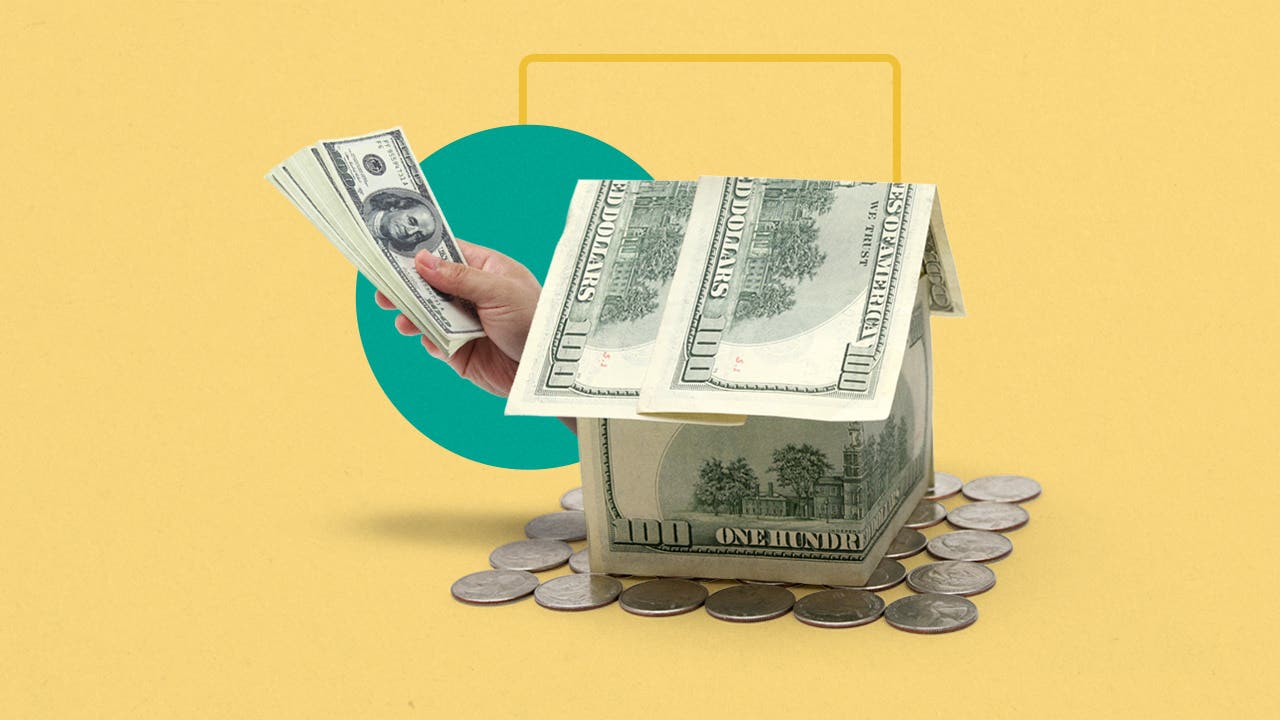
How We Make Money
The businesses whose offers you see on this website pay us. Unless our mortgage, home equity, and other home lending products are specifically prohibited by law, this compensation may have an impact on how and where products appear on this website, including, for example, the order in which they may appear within the listing categories. However, this payment has no bearing on the content we post or the user reviews you see here. We don’t include the range of businesses or loan options that you might have.

Our goal at Bankrate is to assist you in making more informed financial decisions. Although we follow stringent guidelines, this post might mention goods from our partners. Heres an explanation for . Bankrate logo.
Bankrate was established in 1976 and has a long history of assisting consumers in making wise financial decisions. We’ve upheld this reputation for more than 40 years by assisting people in making sense of the financial decision-making process and providing them with confidence regarding their next course of action.
You can rely on Bankrate to prioritize your interests because we adhere to a rigorous editorial policy. All of the content we publish is objective, accurate, and reliable because it is written by highly qualified professionals and edited by subject matter experts.
In order to give you peace of mind when making decisions as a buyer and homeowner, our mortgage reporters and editors concentrate on the topics that matter most to consumers: the newest rates, the greatest lenders, navigating the homebuying process, refinancing your mortgage, and more. Bankrate logo.
You can rely on Bankrate to prioritize your interests because we adhere to a rigorous editorial policy. Our team of distinguished editors and reporters produces truthful and precise content to assist you in making wise financial decisions.
We value your trust. Our goal is to give readers reliable, unbiased information, and we have established editorial standards to make sure that happens. Our reporters and editors carefully verify the accuracy of the editorial content they produce, making sure you’re reading true information. We keep our editorial staff and advertisers apart with a firewall. No direct payment from our advertisers is given to our editorial staff.
The editorial staff at Bankrate writes for YOU, the reader. Providing you with the best guidance possible to enable you to make wise personal finance decisions is our aim. We adhere to stringent policies to guarantee that advertisers have no influence over our editorial content. Advertisers don’t pay our editorial staff directly, and we carefully fact-check all of our content to guarantee accuracy. Thus, you can be sure that the information you’re reading, whether it’s an article or a review, is reliable and reputable. Bankrate logo.
How we make money
You have money questions. Bankrate has answers. For more than 40 years, our professionals have assisted you in managing your finances. We always work to give customers the professional guidance and resources they need to be successful on their financial journey.
Because Bankrate adheres to strict editorial standards, you can rely on our content to be truthful and accurate. Our team of distinguished editors and reporters produces truthful and precise content to assist you in making wise financial decisions. Our editorial team produces factual, unbiased content that is unaffected by our sponsors.
By outlining our revenue streams, we are open and honest about how we are able to provide you with high-quality material, affordable prices, and practical tools.
Bankrate. com is an independent, advertising-supported publisher and comparison service. We receive payment when you click on specific links that we post on our website or when sponsored goods and services are displayed on it. Therefore, this compensation may affect the placement, order, and style of products within listing categories, with the exception of our mortgage, home equity, and other home lending products, where legal prohibitions apply. The way and location of products on this website can also be affected by other variables, like our own unique website policies and whether or not they are available in your area or within your own credit score range. Although we make an effort to present a variety of offers, Bankrate does not contain details about all financial or credit products or services.
- You may be able to access cash or reduce your monthly payments by refinancing your mortgage, but closing costs can range from 2 to 5 percent of the loan principal.
- Attorney fees, home appraisals, and application and origination fees are all included in closing costs.
- With refinances, it’s critical to determine when you’ll break even, or when your new loan savings will exceed your closing cost outlay.
- By improving your credit score, comparing mortgage terms and rates, and negotiating closing costs, you can reduce the cost of refinancing.
How much does it cost to refinance?
The closing costs associated with a mortgage refinance are contingent upon the loan amount as well as your residence’s state and county. According to ClosingCorp, the typical closing costs for a refinance are $2,375, not including taxes.
In general, closing costs should be between 2 and 5 percent of the loan principal. For instance, closing costs for a refinance of a $200,000 mortgage could range from $4,000 to $10,000. When you refinance your home, there are a few different fees that are included in the closing costs.
| Closing costs | Fee |
|---|---|
| Application fee | $75-$300 or more |
| Origination and/or underwriting fee | 0.5%-1.5% of loan principal |
| Recording fee | Cost depends on location |
| Appraisal fee | $300-$400 (more for a larger property) |
| Credit check fee | $25 or more |
| Title services | $700-$900 |
| Survey fee | $150-$400 |
| Attorney/closing fee | $500 or more |
Why refinance your mortgage?
To put it simply, investing a little money now can help you access cash later on or save more money overall. Below is a summary of some of the primary causes for which you may want to think about refinancing your mortgage:
- You can reduce your monthly payment by refinancing if your fixed-rate mortgage has a rate that is higher than current market rates. This will help you pay less each month on your mortgage. Generally speaking, if you can reduce your rate by half to three-quarters of a percentage point, it’s a good idea to think about refinancing.
- You can reduce the length of your loan by refinancing a 30-year mortgage to a 15-year loan, which will allow you to pay it off sooner and pay less interest overall.
- It is possible to convert an adjustable-rate mortgage to a fixed-rate loan. If you currently have an adjustable-rate mortgage, you may wish to do so.
- Private mortgage insurance (PMI) can be removed. Refinancing is one option to do this if your home’s value has increased and you now have 20% equity.
- You can obtain funds for your objectives – If you have sufficient equity, you can refinance for cash out if you wish to make home improvements or reduce credit card debt. Make sure you are realistic with your spending and that you have a clear purpose in mind for these funds. If you refinance other higher-cost debt, are you likely to accrue more debt? Do you intend to use the money for an investment like furthering your education, or for a discretionary expense like a vacation?
Is the cost of refinancing your mortgage worth it?
Refinancing a mortgage requires time and money, so you might want to think twice if there isn’t a payoff in the end.
Regardless of your reason for refinancing, you must account for the closing costs and determine when you will reach your break-even point (the point at which the savings on the new loan exceed the closing costs) as well as how long it will take. Enter the terms of your original and new mortgages into an online mortgage refinance calculator to get an estimate of the possible interest rate and monthly payment. The calculator will then provide you with several scenarios based on your input.
Using the mortgage refinance breakeven calculator on Bankrate.com, for instance, let’s say you had a $400,000 mortgage with a 7 5 percent interest rate. You wish to refinance your loan after five years, when its balance is $378,470, to a new loan with a six-year term. 5 interest rates plus closing costs come to a total of $7,569, or 2 percent of the principal.
Your monthly payments decrease by $405 from $2,797 to $2,392. If you continue at that pace, it would take you nearly 19 months to break even, or for the total amount of your monthly payment reductions to equal your $7,569 closing cost outlay. After those closing costs were recovered, you would begin to see significant savings.
Recouping closing costs will take longer the closer the new rate is to the old. If the new loan had a 7% interest rate, it would take you two 3 years to break even, for example. Refinancing may not be worthwhile if you anticipate selling the house before you reach break-even distance.
Financial advisors frequently advise against refinancing unless you can reduce your interest rate by a full percentage point or two because of this. If your monthly payment’s principal and interest don’t decrease by at least, the Financial Housing Administration (FHA) won’t even allow you to streamline refinance one of its FHA loans. 05 percent.
Of course, there are additional justifications for refinancing, such as reducing the length of your loan, which typically entails higher monthly payments but lower total interest paid.
How to lower the cost to refinance
You must meet minimum credit score requirements in order to refinance, just as you did when you applied for your first mortgage. The better your credit, the lower your refinance rate. One of the many ways to improve your credit is to pay off or reduce your debt.
Compare mortgage offers and rates
Compare offers from multiple banks and other mortgage refinance lenders to obtain the best rate. To have a better understanding of the cost of the loan, be sure to check the APR. To receive a variety of offers, think about working with a mortgage broker. In case your current lender provides a cheaper refinance or other benefits for being a repeat customer, always make sure to get a quote from them as well.
Negotiate closing costs
To determine the precise cost of refinancing, carefully review the loan estimate provided by your lender, just as you did with your initial mortgage. Negotiating closing costs could help you save some money, particularly if you’ve done your research and have multiple refinance offers on the table. To look for fees that are unusually high, you can also compare other quotes.
Ask for fee waivers
Similarly, find out if your bank or lender will waive or reduce the application or credit check fees. Additionally, if you’ve already had a property survey or appraisal completed, you can find out if you can skip the current one. If you are an existing customer, your lender may be open to working with you.
Assess whether to buy mortgage points
Think about whether purchasing mortgage or discount points is worthwhile if you want to reduce your mortgage refinance closing costs. Although purchasing points lowers your interest rate, it’s usually best reserved for long-term homeowners who don’t intend to refinance, even if the points are needed to pay for a significant renovation down the road. When refinancing, you can use Bankrate’s mortgage refinance calculator to calculate whether buying points is worth it.
Go with your original title insurer
Although title rates are regulated in many states, you can try to reduce the cost of title services by finding out how much it would cost for your current title insurance provider to reissue the policy for your refinanced loan. It might be less expensive to do this than to start over with a new business or policy. Additionally, if you didn’t already have an owner’s policy, you might want to get one right away.
Consider a no-closing cost refinance
If you’re low on cash, consider a no-closing-cost refinance. Although the name is a little misleading, this does not mean that you will not have to pay any fees at closing. Instead, your interest rate will be increased by the lender, or the closing costs will be rolled into the new loan.
Frequently asked questions on refinancing your mortgage
- While it might seem like you are just modifying your current mortgage, refinancing actually creates a new mortgage with new terms, interest rates, and sometimes even lenders. When you refinance, you settle your current mortgage in order to obtain a new one.
- When you refinance, a few things will determine whether or not your monthly payments go down, such as the new mortgage’s interest rate and terms. The life of the loan may extend, so even with a lower monthly interest rate, you will ultimately pay more in interest.
- The average national rate for a 30-year fixed refinance as of November 17, 2023, is 7. 8 percent, according to Bankrate survey of national lenders. The average annual percentage rate (APR) for a 15-year fixed refinance is 7 02 percent.


FAQ
Is it expensive to refinance?
Closing costs for refinancing typically range from 2 to 6 percent of the loan principal. In the event that you refinance a $225,000 mortgage balance, for instance, you should budget between $4,500 and $13,500. Similar to purchase loans, origination and multiple third-party fees are standard charges associated with mortgage refinancing.
What is the rate for refinancing a home?
30 year fixed refinance7. 22%15 year fixed refinance6. 39%10 year fixed refinance6. 28%5/1 ARM refinance6. 23%.
Is refinancing my home a good idea?
When then does it make sense to refinance? The general rule of thumb is that if you can lower your current interest rate by 1% or more, it may make sense because of the money you will save. You can also accelerate the process of building equity in your house by refinancing at a lower interest rate.
Do you have to pay closing costs when you refinance?
Similar to when you signed for your first loan, you must pay closing costs when you close on a refinance. It is possible for closing costs to include appraisal, legal, and title insurance costs. Typically, closing costs will account for roughly 2% to 8% of the value of your refinance.
Read More :
https://www.bankrate.com/mortgages/how-much-it-costs-to-refinance/
https://www.rocketmortgage.com/learn/cost-to-refinance
